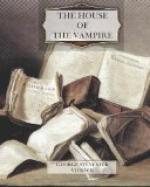“Come, come,” she said, “you do not love me.”
He protested.
“Ah!” she cried triumphantly, “how many sonnets would you give for me? If you were a usurer in gold instead of in rhyme, I would ask how many dollars. But it is unjust to pay in a coin that we value little. To a man starving in gold mines, a piece of bread weighs more than all the treasures of the earth. To you, I warrant your poems are the standard of appreciation. How many would you give for me? One, two, three?”
“More.”
“Because you think love would repay you with compound interest,” she observed merrily.
He laughed.
And when love turns to laughter the danger is passed for the moment.
XV
Thus three weeks passed without apparent change in their relations. Ernest possessed a personal magnetism that, always emanating from him, was felt most deeply when withdrawn. He was at all times involuntarily exerting his power, which she ever resisted, always on the alert, always warding off.
When at last pressure of work made his immediate departure for New York imperative, he had not apparently gained the least ground. But Ethel knew in her heart that she was fascinated, if not in love. The personal fascination was supplemented by a motherly feeling toward Ernest that, sensuous in essence, was in itself not far removed from love. She struggled bravely and with external success against her emotions, never losing sight of the fact that twenty and thirty are fifty.
Increasingly aware of her own weakness, she constantly attempted to lead the conversation into impersonal channels, speaking preferably of his work.
“Tell me,” she said, negligently fanning herself, “what new inspiration have you drawn from your stay at the seaside?”
“Why,” he exclaimed enthusiastically, “volumes and volumes of it. I shall write the great novel of my life after I am once more quietly installed at Riverside Drive.”
“The great American novel?” she rejoined.
“Perhaps.”
“Who will be your hero—Clarke?”
There was a slight touch of malice in her words, or rather in the pause between the penultimate word and the last. Ernest detected its presence, and knew that her love for Reginald was dead. Stiff and cold it lay in her heart’s chamber—beside how many others?—all emboxed in the coffin of memory.
“No,” he replied after a while, a little piqued by her suggestion, “Clarke is not the hero. What makes you think that he casts a spell on everything I do?”
“Dear child,” she replied, “I know him. He cannot fail to impress his powerful personality upon all with whom he comes in contact, to the injury of their intellectual independence. Moreover, he is so brilliant and says everything so much better than anybody else, that by his very splendor he discourages effort in others. At best his influence will shape your development according to the tenets of his mind—curious, subtle and corrupted. You will become mentally distorted, like one of those hunchback Japanese trees, infinitely wrinkled and infinitely grotesque, whose laws of growth are not determined by nature, but by the diseased imagination of the East.”




